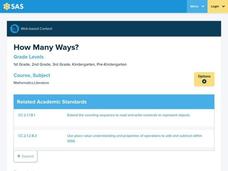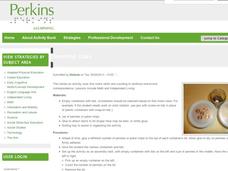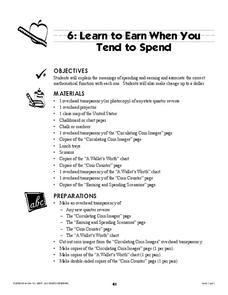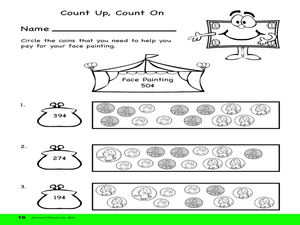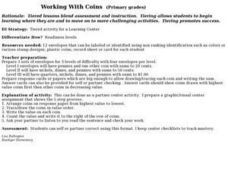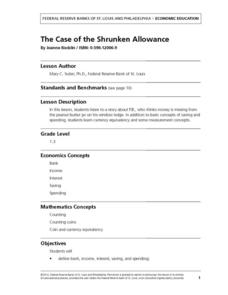Curated OER
Money Bags
Third graders explore different combinations of coins that can be used for specified amounts of money using paper money and tree diagrams. They write money amounts in different forms. Groups utilize a tree diagram imbedded in this lesson...
Curated OER
Money Math Carnival
Third graders explore money in a carnival format. In this money lesson, 3rd graders create a carnival of mathematics activities. Students determine the value of money in mixed amounts and explore how to create representations of money.
Alabama Learning Exchange
Coins to Bills!
Students practice using money at a grocery store. For this money lesson, students get familiar with grocery store ads and work in pairs to use these ads to select food items to purchase using money manipulatives. Students practice being...
Pennsylvania Department of Education
How Many Ways?
Students estimate the amount of money they have in groups of pennies, nickels, and dimes. In this money lesson plan, students then count up the amounts they have and exchange money amounts.
Perkins School for the Blind
Counting Cups
Teach one-to-one correspondence, fine motor, and counting skills to your learners with visual disabilities. Included are a set of activity suggestions, which are useful when teaching a variety of different early math skills. Braille,...
Curated OER
Estimation
Select items to purchase from a store, add up the total cost, then estimate the total cost! Kids count out the money needed to make the purchase and pay for the items. An excelent way to connect real life math and estimation!
Curated OER
Learn to Earn When you Tend to Spend
Analyzing and understanding word problems is extremely important. Pupils learn that in money problems, earn usually means you add and spend usually means you subtract. They will solve a series of money-related word problems, label coins,...
Curated OER
Shopping
Young scholars demonstrate how to count money through a simulated shopping experience. In this consumer math lesson, students read the book Just Shopping With Mom and count play money to illustrate how much the items in the book cost.
Curated OER
Counting Change and Changing Coins
Second graders demonstrate how to count change. In this consumer math lesson, 2nd graders read the book The Penny Pot and identify the value of coins. Students complete a worksheet to practice counting coins.
Curated OER
Money
Young scholars study the value of the penny, nickel, dime, quarter and dollar. They demonstrate how different coin combinations equal the same amounts of money and write money amounts using the decimal point and dollar sign. They try...
Curated OER
Common Sense Cookie Shop
First graders shop for a bag of cookies using toy money. In teams, they choose which variety to buy and decides which bills and coins are necessary to buy the bag of cookies and a cashier makes change. They tally the cookies purchased...
Curated OER
Count On It!
Students practice counting money. In this consumer math lesson, students identify the various U.S. coins and group them in various ways to equal a dollar. Students will use the money they collected for a donation towards a non-profit...
Curated OER
Money Subtraction (A)
In this counting money worksheet, students subtract the money amounts by increments of 50 cents. Students solve twenty money subtraction problems.
Curated OER
Keeping Track of Our Money
Second graders complete activities to learn how to manage money. In this managing money activity, 2nd graders read the book How the Second Grade Got $8,205.50 to Visit the Statue of Liberty and complete two related worksheets.
Curated OER
Working With Coins
Students arrange coins based on their value. In this coins instructional activity, students trace and record the value of each coin. Students count up to find the total value of all the coins.
Curated OER
Money and Business (Art)
Third graders investigate world currency by creating their own coin art. In this government lesson, 3rd graders examine the characteristics of different coins and create their own design for a new one. Students discuss and present...
Curated OER
Reviewing Money
Learners review the concepts on money. In this consumer math instructional activity, students review the vocabulary and value of each coin. Learners are shown coins and identify each one's name and value. Students take an included test...
Curated OER
Children's Literature Across the Curriculum Ideas-If You Made A Million
Students read If You Made A Million by David M. Schwartz. They complete a variety of cross-curricular activities surrounding the study of earning, saving and spending money. Included are reading, art, math, science, writing, social...
Federal Reserve Bank
The Case of the Shrunken Allowance
An allowance is an important thing! Make sure your kids know how to save and spend their own money. Using the book The Case of the Shrunken Allowance as a starting point, this plan covers income, spending and saving, counting, and more.
Curated OER
Money: Demonstrating Coin Value up to $1.00
Students examine coin values up to $1.00 using paper coins. For this coin value lesson, students compare and contrast various coins to aid in identification, sort coins from smallest to largest, and match an equal number of pennies to...
Curated OER
Coins
Second graders observe and demonstrate how to count the value of assorted coins. They discuss a story from their Math Storybook, and as a class solve a variety of problems using activity sheets. Students then independently complete a...
Curated OER
Counting Coins
Learners identify the different types of coins. They practice buying objects in the classroom with their coins. They must use different combinations of coins in all situations.
Curated OER
Money Talks Canadian Money
Students use newspapers, games and journal writing activities to examine the importance of money and the role it plays in daily life. They complete several math problems, fill out worksheets and practice changing varying amounts.
Curated OER
Spending Money
First graders practice adding monetary values. In this money lesson, 1st graders discuss fair trades and then use coin values to purchase items from a class store. A video titled "Blossom and Snappy Go to the Bank, Part Two".





